
Klara and the Sun
This is so clearly an Ishiguro book. It is soft and subtle and uses the voice of a wonderful protagonist whose blissful naivete (sometimes deliberate, sometimes incidental) wins you over to their side before smacking you once, then twice, then a third time with how terrible a lot they've inherited. The reveal of many things in this story (Klara's fate; the role of the "portrait"; the status of being "lifted") is so similar to the reveal of Remains of the Day's protagonist's master's Nazi sympathies, or the central raison d'etre of Never Let Me Go ↗. It is perhaps a little more heavy-handed and explicit than those books, which I think you can reasonably argue are better pieces of literature; this feels more like a victory lap, of Ishiguro underlining his particular brand of storytelling even with pieces that are on the whole a little less satisfying.
But I loved this book more than critical consensus, largely because of Klara who I would defend to the death. Her voice, robotic and sweet, is a vision of artificial life that I think is more earnest and winning than the scores of "what if AI but soft dystopia" books that have paved the road. It reminds me of, if anything, Yokohama Kaidashi Kikō ↗, a piece of art similarly less concerned with the "how and why" of civilization collapse and more concerned with the "what next?".
And the ending image that we're left with — Klara in the Yard, a place both chilling and mundane, with her happy and satisfied to sift through her hard-earned memories, is an image that will stick with me for a long time.
© 2023 Justin Duke • I hope you're wearing your favorite sweater.